

Cerego Launches Suite of Smart Tools for Adaptive Learning. SAN FRANCISCO, Calif.
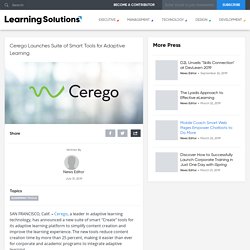
. – Cerego, a leader in adaptive learning technology, has announced a new suite of smart "Create" tools for its adaptive learning platform to simplify content creation and improve the learning experience. The new tools reduce content creation time by more than 25 percent, making it easier than ever for corporate and academic programs to integrate adaptive learning.
The new smart Create tools use natural language processing to allow instructional designers and teachers to easily build custom learning experiences, while in turn improving the quality of the experience for the learner, which has always been the company’s core focus. Cerego’s tools are content agnostic and can be applied to any subject matter or skillset. Elevate - Features - Unlock 35+ Brain Training Games. Adaptive Learning. Adaptive learning is a form of personalized learning that allows each learner to adjust their pathway to mastery of material based upon sophisticated analytical technologies.
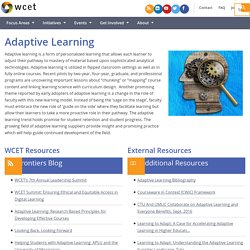
Adaptive learning is utilized in flipped classroom settings as well as in fully online courses. Recent pilots by two-year, four-year, graduate, and professional programs are uncovering important lessons about “chunking” or “mapping” course content and linking learning science with curriculum design. Another promising theme reported by early adopters of adaptive learning is a change in the role of faculty with this new learning model.
Instead of being the 'sage on the stage', faculty must embrace the new role of 'guide on the side' where they facilitate learning but allow their learners to take a more proactive role in their pathway. Adaptive Learning Unplugged: Why Instructors Matter More than Ever. Far from replacing instructors, adaptive learning gives them the data they need to engage students in new ways.
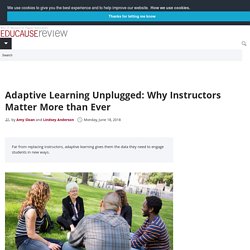
Proponents of adaptive learning (AL) technology tout its great value as being its ability to create student-centered classrooms in their most individualized form, shy of limiting the student-to-teacher ratio to 5:1 or less. AL does this by customizing learning based on the knowledge each student brings to the course. While this personalization benefit is certainly seductive, the major question some educators are left with is: Where does this leave the teachers? An Adaptive Learning Partnership.
The University of Central Florida and Colorado Technical University partnered with Realizeit to explore how best to use an adaptive learning platform to increase student success.
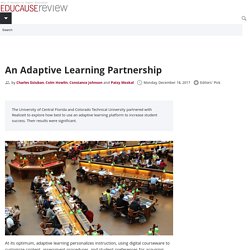
Their results were significant. At its optimum, adaptive learning personalizes instruction, using digital courseware to customize content, assessment procedures, and student preferences for acquiring information. It has been called "the next big thing" because rapidly developing technologies maximize the potential for increasing achievement and eliminating course bottlenecks in higher education.1 As with so many technological innovations, people sometimes assume that AL is a breakthrough as well as new development. However, adaptive learning is anything but new — the idea has been around for well over five decades, and, if the emerging research is any indication, it will endure for several more.
Adaptive learning - learning science. 7 Things You Should Know About Adaptive Learning. Adaptive learning is one technique for providing personalized learning, which aims to provide efficient, effective, and customized learning paths to engage each student.
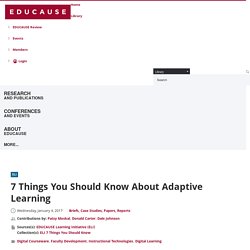
Adaptive learning systems use a data-driven approach to adjust the path and pace of learning, enabling the delivery of personalized learning at scale. Adaptive systems can support changes in the role of faculty, enable innovative teaching practices, and incorporate a variety of content formats to support students according to their learning needs. The 7 Things You Should Know About... series from the EDUCAUSE Learning Initiative (ELI) provides concise information on emerging learning technologies. Each brief focuses on a single technology and describes what it is, where it is going, and why it matters to teaching and learning. Use these briefs for a no-jargon, quick overview of a topic and share them with time-pressed colleagues. Journal of Computerized Adaptive Testing. JCAT is a peer-reviewed electronic journal designed to advance the science and practice of computerized adaptive testing (CAT).
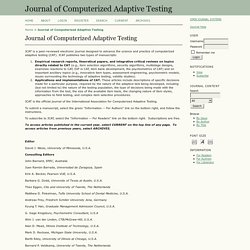
JCAT publishes two types of manuscripts: Empirical research reports, theoretical papers, and integrative critical reviews on topics directly related to CAT (e.g., item selection algorithms, security algorithms, multistage designs, examinee reactions to CAT, DIF in CAT, item bank development, the psychometrics of CAT) and on important ancillary topics (e.g., innovative item types, assessment engineering, psychometric models, issues surrounding the technology of adaptive testing, validity studies).Applications and implementations of CAT.
To submit a manuscript, select the green "Information -- For Authors" link on the bottom right, and follow the instructions. How ALEKS Works. What is Adaptive Learning Anyway? A look at the science and research behind adaptive learning technology and its application in the classroom.
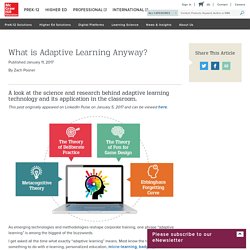
This post originally appeared on LinkedIn Pulse on January 5, 2017 and can be viewed here. As emerging technologies and methodologies reshape corporate training, one phrase “adaptive learning” is among the biggest of the buzzwords. USM Center for Academic Innovation. Adaptive learning is an educational method which uses computers as interactive teaching devices to orchestrate the allocation of human and mediated resources according to the unique needs of each learner.
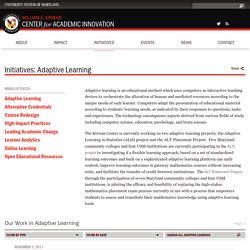
Computers adapt the presentation of educational material according to students' learning needs, as indicated by their responses to questions, tasks and experiences. The technology encompasses aspects derived from various fields of study including computer science, education, psychology, and brain science. The Kirwan Center is currently working on two adaptive learning projects: the Adaptive Learning in Statistics (ALiS) project and the ALT-Placement Project.
ALEKS for Higher Education. Biology Courseware from CogBooks - CogBooks. Western University of Health Sciences. The development and evaluation of a software prototype for computer-adaptive testing. <div class="alert-message-container" role="alert"><div class="alert-message-body" aria-hidden="true"><span class="Icon IconAlert" style="display:inline-block"><svg fill="currentColor" style="width:100%;height:100%" tabindex="-1" focusable="false" height="24" width="24"><path d="M11.84 4.63c-.77.05-1.42.6-1.74 1.27-1.95 3.38-3.9 6.75-5.85 10.13-.48.83-.24 1.99.53 2.56.7.6 1.66.36 2.5.41 3.63 0 7.27.01 10.9-.01 1.13-.07 2.04-1.28 1.76-2.39-.1-.58-.56-1.02-.81-1.55-1.85-3.21-3.69-6.43-5.55-9.64-.42-.52-1.06-.83-1.74-.79z" fill="#f80"></path><path d="M11 8h2v5h-2zM11 14h2v2h-2z"></path></svg></span>JavaScript is disabled on your browser.
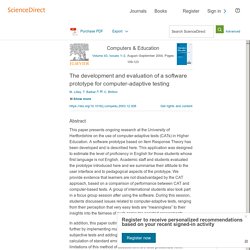
Please enable JavaScript to use all the features on this page. </div></div> Abstract This paper presents ongoing research at the University of Hertfordshire on the use of computer-adaptive tests (CATs) in Higher Education. The development and evaluation of a software prototype for computer-adaptive testing. Computer Adaptive Testing Tutorial. Baker, F. (1985) The basics of item response theory.
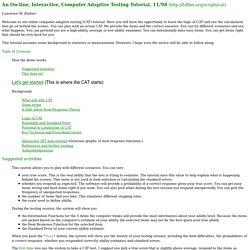
Portsmouth, NH: Heinemann Educational Books (out of print). Bergstrom, B. (1992) Ability measure equivalents of computer adaptive and pencil and paper tests: A research synthesis. Paper presented at the annual meeting of the American Educational Research Association, San Francisco. Journal of Computerized Adaptive Testing. Teaching Head & Neck Anatomy in a Blended Learning Environment - Teaching with Technology. By Robert W. Hasel, D.D.S., Associate Dean, College of Dental Medicine. The need for change in education has been an ongoing discussion for many years. For more than three centuries the pedagogical model of delivering education has been the traditional lecture based approach, placing large groups of students in a room and reciting lectures to them.
This passive learning environment requires students to memorize lectures without internalizing the complexity of scientific inquiry. In the 21st century, the ever-changing society we live in has placed different demands on the way learners learn and health practitioners practice their professions. American Public University System Launches Momentum™ Competency-Based Education Program to Provide Flexible, Personalized Degree Path for Adult Learners. Charles Town, WV, Feb. 2, 2017 — American Public University System (APUS) today announced Momentum, a new competency-based education (CBE) program designed to further enhance the flexibility and affordability of delivering innovative, career-relevant offerings for working adults.
“Momentum, unlike traditional academic programs, focuses on the achievement of knowledge and skills, providing a more flexible degree path to non-traditional students seeking an alternative to prevailing schedule and tuition constraints,” said APUS Director of Alternative Learning Cali Morrison. Four initial programs will offer competency starts beginning March 6, including: B.A., Criminal Justice; B.A., Emergency and Disaster Management; B.S., Fire Science Management; and B.A., Retail Management. Adaptive Learning at Western University of Health Sciences. Stanford medical school online learning. Adaptive learning featured in HarvardX course. The Harvard University strategic initiative HarvardX is running a massive open online course (MOOC) that features adaptive learning and assessment algorithms that tailor course material in response to student performance. “Adaptive learning functionality,” through which a computer system can fit learning experiences to the needs of each student, had not been offered previously in a HarvardX course and is featured in a few courses across the edX online learning platform.
But it is being used in “Super-Earths and Life,” taught by Harvard’s Phillips Professor of Astronomy Dimitar Sasselov. The presentation is designed to gain a preliminary assessment of the technological feasibility and implications of adaptive functionality to online course design. Depending on the results, the technology may expand to other HarvardX MOOCs. Adaptive learning featured in HarvardX course.